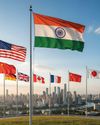Prøve GULL - Gratis
NEED TO DECONSTRUCT THE INDIA-CHINA-US TRIANGLE
Extraordinary and Plenipotentiary Diplomatist
|January 2021
Since the turn of the millennium, coinciding with the realization that the Cold War had ended, the geo-political and geo-economic center of the world shifted from the Atlantic Ocean to what is now called the Indo-Pacific Region.

Since then, much of India’s worldview has been dominated either by the prism of the India-China-US triangle or what the India-US relationship means for New Delhi’s engagement with an assertive and once adversarial neighbor, namely, China, and vice versa. Deep-seated Indian suspicions were proved right with the Chinese aggression, first in Doklam (2017) and now Galwan (2020).
The genesis of the triangular discourse, though going back to the long lost pages of history, can be pegged to the Indo-US Civilian Nuclear Agreement of 2005 and the subsequent rewriting of the established global legal norms on nuclear trade, through an exclusive one-time waver in India’s favor. Prior to the rapprochement between New Delhi and Washington, the nature of the India-US bilateral relationship bordered on lukewarm civil cordiality and lacked real meaning.
Substantial Shift
The ‘Nuclear Deal’, as it is known. was not only a technical arrangement between India and the US to open up bilateral and multilateral engagement in what was otherwise a restricted club sans India, but it also marked a very substantial shift in the nature of bilateral political ties. Until 2005, India-US ties were seen within the larger context of South Asia and Washington’s role in balancing its relationship with India and Pakistan and also in playing the role of a self-designated referee or peace-broker with the aim of limiting hostilities between the other two.
Denne historien er fra January 2021-utgaven av Extraordinary and Plenipotentiary Diplomatist.
Abonner på Magzter GOLD for å få tilgang til tusenvis av kuraterte premiumhistorier og over 9000 magasiner og aviser.
Allerede abonnent? Logg på
FLERE HISTORIER FRA Extraordinary and Plenipotentiary Diplomatist

Extraordinary and Plenipotentiary Diplomatist
Indian Strategies for Diversifying Export Markets Amid U.S. Tariff Pressures
India's rising economic power at the international level has presented challenges alongside opportunities to New Delhi.
5 mins
October 2025

Extraordinary and Plenipotentiary Diplomatist
Compulsions and Constraints before India's Foreign Policy
Although the present leadership in India clearly supports a multipolar world order, the US’s unparalleled ascendance with its self-obsessed approach in international relations has gravely hurt the national interests of poor and developing nations clubbed as the Third World, including India.
3 mins
October 2025

Extraordinary and Plenipotentiary Diplomatist
Responsible AI & Global Governance
India's Role amid BRICS, G20, and Global South Calls
7 mins
October 2025

Extraordinary and Plenipotentiary Diplomatist
INDIA AT UNGA-80 From Presence to Proposition
Every September, New York's diplomat-strewn avenues assume the cadence of high diplomacy.
6 mins
October 2025

Extraordinary and Plenipotentiary Diplomatist
Wadephul in India
Germany's India Outreach in a Fragmented Europe
4 mins
October 2025

Extraordinary and Plenipotentiary Diplomatist
RAPPROCHEMENT WITH CHINA
BEYOND THE BORDER - TRADE, COMMERCE, AND PEOPLE-TO-PEOPLE TIES
5 mins
October 2025

Extraordinary and Plenipotentiary Diplomatist
FTAs and Outward FDIS
Way forward to safeguard national interest in the Trump Era
4 mins
October 2025

Extraordinary and Plenipotentiary Diplomatist
What Leaders Must Do Now: Sir David King's Call for Climate Action
Sir David King is one of the world's foremost climate change leaders, renowned for his tireless work in confronting the global climate crisis. Serving as the UK Government's Chief Scientific Adviser from 2000 to 2007, he was instrumental in placing climate change at the top of the international agenda.
6 mins
October 2025

Extraordinary and Plenipotentiary Diplomatist
Safe Food, Secure Future
Globally, nearly 600 million people suffer from foodborne diseases, and more than 400,000 die each year from consuming unhygienic and unsafe food.
3 mins
October 2025

Extraordinary and Plenipotentiary Diplomatist
H-1B Visa Fee Surge & India's Tech Sector Exodus or Adaptation?
\"When the winds of change blow, some build walls, others build windmills.” It’s an old saying, but it fits quite well right now. With the U.S. suddenly raising H-1B visa petition fees to $100,000, India’s tech industry finds itself in the middle of a storm.
2 mins
October 2025
Translate
Change font size

